句子成分与基本句型
七大句子成分与五大基本句型

七大句子成分与五大基本句型Part 1 句子成分组成句子的各个部分叫做句子成分;它包括:主语、谓语、宾语、定语、状语、表语和宾语补足语1. 主语:主语是一句话的中心;除祈使句外,主语是句子中不可缺少的成分;主语表示句子中所说的是“谁”或“什么”;一般由名词、代词、数词、不定式或动名词等充当注意若不定式短语作主语常用it作形式主语,而把真正的主语不定式短语放在句后;2. 谓语:说明主语的动作或状态,也是句子的主体部分,一般由动词充当;谓语分为简单谓语与复合谓语两种简单谓语由动词或动词词组组成;复合谓语由情态动词或助动词+动词注意谓语与主语在人称与数方面要相互照应;3.宾语:宾语是动作行为的对象,说明主语“做什么”, 一般由名词、代词、不定式及动名词等充当;宾语分为直接宾语Direct Object和间接宾语Indirect Object;直接宾语常指物,间接宾语常指人;“物植人间”4.表语:在系动词后的部分就是表语,说明主语的状态等,一般由名词、数词、形容词、分词等充当;系动词不用于被动语态;“……怎么样”常见的系动词:beam,is,are,were,was,appear,look,seem,feel,smell,taste,soun d,keep,turn,become, get, grow, come, go etc.5.定语:用于修饰名词或代词,一般由形容词、名词、数词、不定式等充当;注意定语一般位于被修饰词之前,但若修饰不定代词或不定式等短语作定语,则放在后面;6.状语:用于修饰形容词,副词,动词,介词短语或句子.可表示时间,地点,原因,结果,目的,方式, 伴随,条件,程度,让步,频率等,一般由副词、介词短语、不定式短语或从句充当;单个副词作状语一般放在被修饰词之前,短语或从句放在句首或句末注意enough作状语只能放在被修饰词之后;如:He is old enough to go to school7.宾语补足语:用于补充说明宾语的动作,一般位于宾语之后,宾语与宾语补足语一起构成复合宾语;需接复合宾语的动词有:tell,let,help,teach, ask,see,have,order,make等;“宾补”一般由不定式短语、分词、名词、形容词等充当;随堂练习讲出划线部分的句子成分:1. Her suggestion sounds quite reasonable.2. I have a lot to say on this matter.3. Please give me some advice.4. She is quite all right now.5. A lonely person is always alone.6. A fat, sandy-haired boy in jeans came to see Miss White. 7. To travel abroad, one must have a passport8. He has brought back a book reporting on animal life. 9. The setting sun shone on her face, lighting it up with a rosy glow.10. Isn’t it wonderful that the Chinese Team wonPart 2 基本句型基本句型Basic Sentence Patterns(1)第一基本句型主+谓 S+VI teach.2 第二基本句型主+系+表 S+V+PI am a teacher.3 第三基本句型主+谓+宾 S+V+OI teach English.4 第四基本句型主+谓+间宾+直宾 S+V+IO+DOI teach you English.5第五基本句型主+谓+宾+宾补S+V+O+CI encourage you to learn English better.课后习题分析句子结构:1.What you said made me happy.2.Could you give me some advice on how to learn English well 3.After he finished his homework, he went away.4. He likes pop music.5. I stayed awake until 11:30 one evening in order to have a good look at the moon for once by myself.6. Anne named her diary kitty because she thought it was her best friend7. I find painting or drawing very relaxing.8. It is the young girl who was singing songs on the stage when we entered the hall yesterday that will have taught all of us both English and French for three years by the end of this year.。
句子成分和基本句型
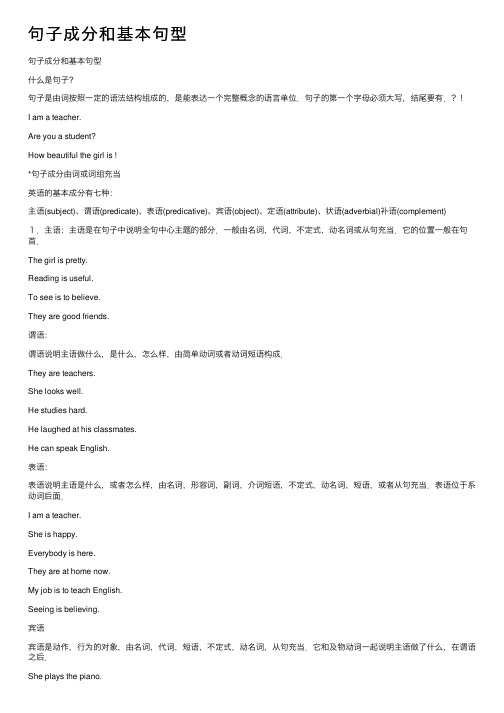
句⼦成分和基本句型句⼦成分和基本句型什么是句⼦?句⼦是由词按照⼀定的语法结构组成的,是能表达⼀个完整概念的语⾔单位.句⼦的第⼀个字母必须⼤写,结尾要有.?!I am a teacher.Are you a student?How beautiful the girl is !*句⼦成分由词或词组充当英语的基本成分有七种:主语(subject)、谓语(predicate)、表语(predicative)、宾语(object)、定语(attribute)、状语(adverbial)补语(complement)1.主语:主语是在句⼦中说明全句中⼼主题的部分.⼀般由名词,代词,不定式,动名词或从句充当.它的位置⼀般在句⾸.The girl is pretty.Reading is useful.To see is to believe.They are good friends.谓语:谓语说明主语做什么,是什么,怎么样,由简单动词或者动词短语构成.They are teachers.She looks well.He studies hard.He laughed at his classmates.He can speak English.表语:表语说明主语是什么,或者怎么样,由名词,形容词,副词,介词短语,不定式,动名词,短语,或者从句充当.表语位于系动词后⾯.I am a teacher.She is happy.Everybody is here.They are at home now.My job is to teach English.Seeing is believing.宾语宾语是动作,⾏为的对象,由名词,代词,短语,不定式,动名词,从句充当.它和及物动词⼀起说明主语做了什么,在谓语之后.She plays the piano.He often helps me.I like watching TV.She likes to go to shop this afternoon.I think that he is good guy.宾语补⾜语在英语中,有些句⼦只有宾语并不能表达完整的意思,还必须在宾语后⾯家上宾语补⾜语才能表达完整的意思.它起补充说明宾语⼲什么,怎么样的作⽤.它可以由名词,形容词,副词,介词短语,不定式,现在分词和过去分词充当.If you let me go, I’ll make you king.Leave the door open.We found John out when we arrived.Make yourself at home.I saw him enter the hall.The boss keeps them working all day.I heard my name called.掌握这五种基本句型, 是掌握各种英语句⼦结构的基础。
八大句子成分和五个基本句型

宾)
│
│
│
1. She ordered herself a new dress.
她给│自己定了│一套│新衣裳.
2. I showed him my pictures. 我给他
看我的│照片. │ │
3. He bought you a dictionary.他
给你买了一本字典.
5. S + Vt. + O + C (主+谓+宾+宾
相同,后者是前者的同位语。 ❖Mr. Smith, our new teacher, is very
kind to us.
Practice:
The tall boy often plays football in the playground at weekends.
(定语)主语 (状语)+ 谓语 +宾语(状 语 状语)
❖3)宾语:表示行为的对象,动作的承受者 ❖People make chances. ❖I am reading a book. ❖I like to play with him.
❖4)定语:是用来说明或者限制名词的成分, 常用形容词或者相当于形容词的短语或从 句担任。
❖This is a red sun. ❖He is a tall boy. ❖I bought an English-Chinese
❖Students study. ❖We are friends.
❖2)谓语:是对主语加以陈主语的后面。如:
❖We plant trees every year. ❖We study for the people. ❖I can speak a little English.
句子成分及基本句型
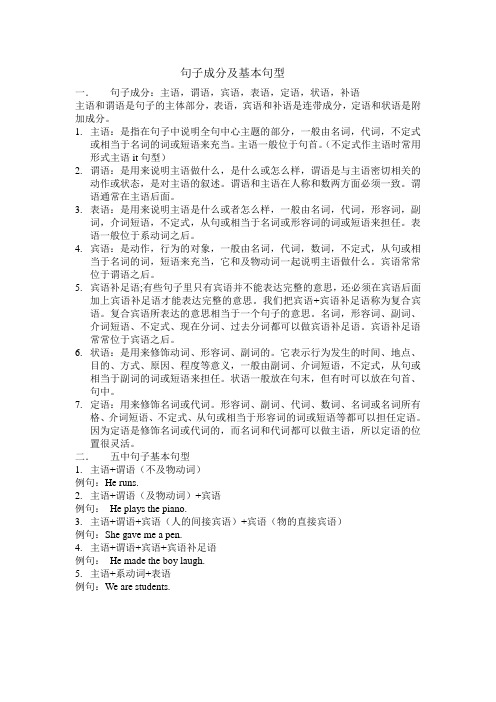
句子成分及基本句型一.句子成分:主语,谓语,宾语,表语,定语,状语,补语主语和谓语是句子的主体部分,表语,宾语和补语是连带成分,定语和状语是附加成分。
1.主语:是指在句子中说明全句中心主题的部分,一般由名词,代词,不定式或相当于名词的词或短语来充当。
主语一般位于句首。
(不定式作主语时常用形式主语it句型)2.谓语:是用来说明主语做什么,是什么或怎么样,谓语是与主语密切相关的动作或状态,是对主语的叙述。
谓语和主语在人称和数两方面必须一致。
谓语通常在主语后面。
3.表语:是用来说明主语是什么或者怎么样,一般由名词,代词,形容词,副词,介词短语,不定式,从句或相当于名词或形容词的词或短语来担任。
表语一般位于系动词之后。
4.宾语:是动作,行为的对象,一般由名词,代词,数词,不定式,从句或相当于名词的词,短语来充当,它和及物动词一起说明主语做什么。
宾语常常位于谓语之后。
5.宾语补足语;有些句子里只有宾语并不能表达完整的意思,还必须在宾语后面加上宾语补足语才能表达完整的意思。
我们把宾语+宾语补足语称为复合宾语。
复合宾语所表达的意思相当于一个句子的意思。
名词,形容词、副词、介词短语、不定式、现在分词、过去分词都可以做宾语补足语。
宾语补足语常常位于宾语之后。
6.状语:是用来修饰动词、形容词、副词的。
它表示行为发生的时间、地点、目的、方式、原因、程度等意义,一般由副词、介词短语,不定式,从句或相当于副词的词或短语来担任。
状语一般放在句末,但有时可以放在句首、句中。
7.定语:用来修饰名词或代词。
形容词、副词、代词、数词、名词或名词所有格、介词短语、不定式、从句或相当于形容词的词或短语等都可以担任定语。
因为定语是修饰名词或代词的,而名词和代词都可以做主语,所以定语的位置很灵活。
二.五中句子基本句型1.主语+谓语(不及物动词)例句:He runs.2.主语+谓语(及物动词)+宾语例句:He plays the piano.3.主语+谓语+宾语(人的间接宾语)+宾语(物的直接宾语)例句:She gave me a pen.4.主语+谓语+宾语+宾语补足语例句:He made the boy laugh.5.主语+系动词+表语例句:We are students.知识补充一.词类包括:名词,代词,冠词,数词,形容词,副词,动词,介词,连词,感叹词十种。
句子成分和五种基本句型
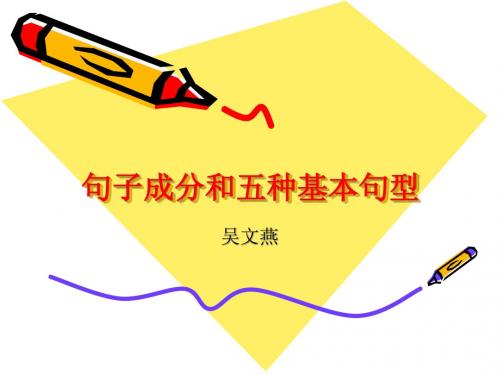
句子的成分表
类 句中 别 成分 主 主语 要 成 分 谓语 次 表语 要 成 分 宾语 语法意义 例句
句子的主体, 句子的主体,说明 We can speak a little 所说的是“ 所说的是“谁”或 English. 什么” 是“什么” The book is mine. 表示主语的动作, 表示主语的动作, We love our country. 特征或状态 He is watching TV. 位于连系动词之后, 位于连系动词之后,We are busy today. 说明主语的身份、 说明主语的身份、 Knowledge is very important. 特征、 特征、属性或状态 表示动作的对象或 She is reading a book. 行为的承受者 I killed him.
Sb do
1. The sun│rose. │ 2. They │are talking.
基本句型 二
S +V +P(主+系+表) P(主
此句型的句子有一个共同的特点: 此句型的句子有一个共同的特点:句子谓语 动词都不能表达一个完整的意思, 动词都不能表达一个完整的意思,必须加上一个 表明主语身份或状态的表语构成复合谓语, 表明主语身份或状态的表语构成复合谓语,才能 表达完整的意思。这类动词叫做连系动词。 表达完整的意思。这类动词叫做连系动词。
• 说明:有些系动词同时也是实义动词,该动词 说明:有些系动词同时也是实义动词, 表达实义时,有词义,可单独作谓语, 表达实义时,有词义,可单独作谓语, • 例如: 例如: • He fell ill yesterday. 他昨天病了。(fell是 他昨天病了。 是 系动词,后跟补足语,说明主语情况。) 系动词,后跟补足语,说明主语情况。 • He fell off the ladder. 他从梯子上摔下来。 他从梯子上摔下来。 (fell是实义动词,单独作谓语。) 是实义动词, 是实义动词 单独作谓语。 • The soft drinking tastes quite sour. (taste作系动词,不能使用进行时,后 作系动词, 作系动词 不能使用进行时, 面接形容词。 面接形容词。) • The chef is tasting the fish carefully. (作 作 实意动词,使用进行时,并后接副词做状语) 实意动词,使用进行时,并后接副词做状语
句子成分和基本句型
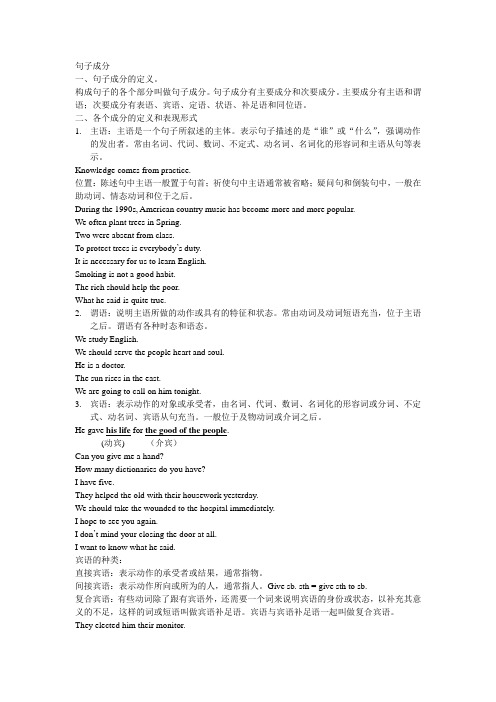
句子成分一、句子成分的定义。
构成句子的各个部分叫做句子成分。
句子成分有主要成分和次要成分。
主要成分有主语和谓语;次要成分有表语、宾语、定语、状语、补足语和同位语。
二、各个成分的定义和表现形式1.主语:主语是一个句子所叙述的主体。
表示句子描述的是“谁”或“什么”,强调动作的发出者。
常由名词、代词、数词、不定式、动名词、名词化的形容词和主语从句等表示。
Knowledge comes from practice.位置:陈述句中主语一般置于句首;祈使句中主语通常被省略;疑问句和倒装句中,一般在助动词、情态动词和位于之后。
During the 1990s, American country music has become more and more popular.We often plant trees in Spring.Two were absent from class.To protect trees is everybody’s duty.It is necessary for us to learn English.Smoking is not a good habit.The rich should help the poor.What he said is quite true.2.谓语:说明主语所做的动作或具有的特征和状态。
常由动词及动词短语充当,位于主语之后。
谓语有各种时态和语态。
We study English.We should serve the people heart and soul.He is a doctor.The sun rises in the east.We are going to call on him tonight.3.宾语:表示动作的对象或承受者,由名词、代词、数词、名词化的形容词或分词、不定式、动名词、宾语从句充当。
一般位于及物动词或介词之后。
He gave his life for the good of the people.(动宾) (介宾)Can you give me a hand?How many dictionaries do you have?I have five.They helped the old with their housework yesterday.We should take the wounded to the hospital immediately.I hope to see you again.I don’t mind your closing the door at all.I want to know what he said.宾语的种类:直接宾语:表示动作的承受者或结果,通常指物。
句子成分及用法,五大基本句型结构

句子成分及用法,五大基本句型结构一、句子成分。
(一)主语。
1. 定义与作用。
- 主语是句子陈述的对象,表示句子所说的是“谁”或者“什么”。
它是句子的核心成分之一,决定了句子描述的主体。
例如在句子“Tom likes reading.”中,“Tom”就是主语,这个句子主要是在描述Tom的喜好。
2. 构成。
- 主语可以由名词、代词、数词、动名词、不定式、名词化的形容词或从句等充当。
- 名词作主语很常见,如“Dogs are friendly animals.”中的“Dogs”。
- 代词作主语,例如“He is my friend.”中的“He”。
- 数词作主语,像“Three is a lucky number in some cultures.”中的“Three”。
- 动名词作主语,如“Running is good for health.”中的“Running”。
- 不定式作主语,“To learn English well takes time.”中的“To learn English well”。
- 名词化的形容词作主语,“The rich should help the poor.”中的“The rich”。
- 从句作主语,“What he said is very important.”中的“What he said”。
(二)谓语。
1. 定义与作用。
- 谓语是对主语动作或状态的陈述或说明,指出“做什么”“是什么”或者“怎么样”。
在句子中,谓语动词的形式要与主语的人称和数保持一致。
例如在“Mary sings beautifully.”中,“sings”就是谓语,它描述了Mary的动作。
2. 构成。
- 谓语一般由动词充当,包括实义动词、系动词、助动词和情态动词等。
- 实义动词可以独立作谓语,表示具体的动作,如“eat”“drink”“run”等。
例如“He eats an apple.”中的“eats”。
句子成分与基本句型
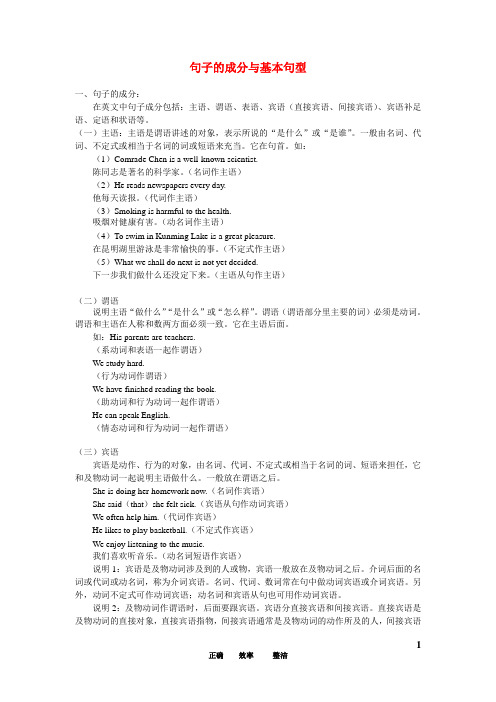
句子的成分与基本句型一、句子的成分:在英文中句子成分包括:主语、谓语、表语、宾语(直接宾语、间接宾语)、宾语补足语、定语和状语等。
(一)主语:主语是谓语讲述的对象,表示所说的“是什么”或“是谁”。
一般由名词、代词、不定式或相当于名词的词或短语来充当。
它在句首。
如:(1)Comrade Chen is a well-known scientist.陈同志是著名的科学家。
(名词作主语)(2)He reads newspapers every day.他每天读报。
(代词作主语)(3)Smoking is harmful to the health.吸烟对健康有害。
(动名词作主语)(4)To swim in Kunming Lake is a great pleasure.在昆明湖里游泳是非常愉快的事。
(不定式作主语)(5)What we shall do next is not yet decided.下一步我们做什么还没定下来。
(主语从句作主语)(二)谓语说明主语“做什么”“是什么”或“怎么样”。
谓语(谓语部分里主要的词)必须是动词。
谓语和主语在人称和数两方面必须一致。
它在主语后面。
如:His parents are teachers.(系动词和表语一起作谓语)We study hard.(行为动词作谓语)We have finished reading the book.(助动词和行为动词一起作谓语)He can speak English.(情态动词和行为动词一起作谓语)(三)宾语宾语是动作、行为的对象,由名词、代词、不定式或相当于名词的词、短语来担任,它和及物动词一起说明主语做什么。
一般放在谓语之后。
She is doing her homework now.(名词作宾语)She said(that)she felt sick.(宾语从句作动词宾语)We often help him.(代词作宾语)He likes to play basketball.(不定式作宾语)We enjoy listening to the music.我们喜欢听音乐。
句子的成分和基本句型

句子的成分和基本句型句子是由各种词类按照一定的语法规则组成的,可以表达完整的概念。
句子开头第一个字母一定要大写,结尾要注明标点符号。
一、句子的成分组成句子的各个部分叫作句子的成分。
句子的成分有主语、谓语、表语、宾语(直接宾语和间接宾语)、宾语补足语、定语和状语。
其中主语和谓语是句子的主体,表语、宾语和宾语补足语是谓语的组成部分,其他成分如定语和状语是句子的次要部分。
1 主语+不及物动词(S+V)主语表示所说的“是什么”或“是谁”,通常用名词、代词、不定式或相当于名词的词、短语或从句担任。
主语要放在句首。
The girl studies in No.4 Middle School.这个女孩子在四中学习。
(叙述“谁”)The post office is open.邮局开门了。
(叙述“事,什么”)Only five are here.只有五个人来了。
(数词作主语)To say is one thing, and to do is another.说是一回事,做是另一回事。
(不定式作主语)What you said hurt me badly.你所说的话深深地刺伤了我。
(从句作主语)注意:it作主语时,可以有以下作用:①表示时间、天气、季节、距离和自然现象。
It's twelve thirty.现在十二点半。
It's windy today.今天刮大风。
It's autumn and they want to go for an out of town tour.这是秋天,他们要去郊游。
It's only ten minutes walk from here.从这儿走十分钟就到了。
It was so hot in this summer.今年夏天可真热!②表示刚刚提到的事情。
What's this? It's a fox.这是什么? 它是一只狐狸。
What's that? It's your new coat.那是什么? 是你的新大衣。
句子成分和基本句型
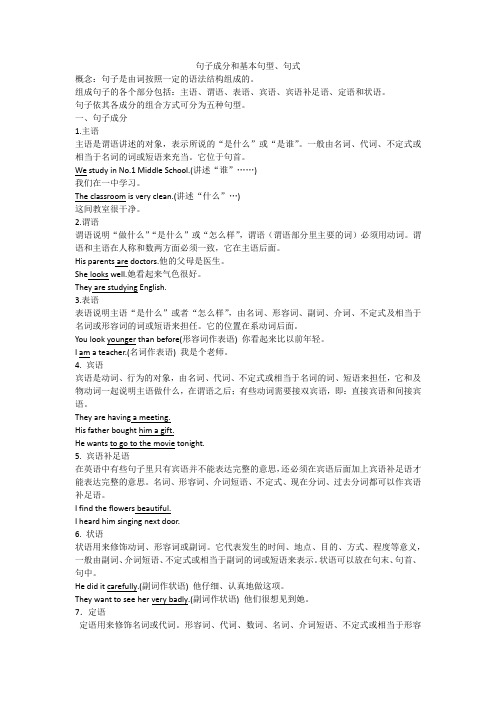
句子成分和基本句型、句式概念:句子是由词按照一定的语法结构组成的。
组成句子的各个部分包括:主语、谓语、表语、宾语、宾语补足语、定语和状语。
句子依其各成分的组合方式可分为五种句型。
一、句子成分1.主语主语是谓语讲述的对象,表示所说的“是什么”或“是谁”。
一般由名词、代词、不定式或相当于名词的词或短语来充当。
它位于句首。
We study in No.1 Middle School.(讲述“谁”……)我们在一中学习。
The classroom is very clean.(讲述“什么”…)这间教室很干净。
2.谓语谓语说明“做什么”“是什么”或“怎么样”,谓语(谓语部分里主要的词)必须用动词。
谓语和主语在人称和数两方面必须一致,它在主语后面。
His parents are doctors.他的父母是医生。
She looks well.她看起来气色很好。
They are studying English.3.表语表语说明主语“是什么”或者“怎么样”,由名词、形容词、副词、介词、不定式及相当于名词或形容词的词或短语来担任。
它的位置在系动词后面。
You look younger than before(形容词作表语) 你看起来比以前年轻。
I am a teacher.(名词作表语) 我是个老师。
4. 宾语宾语是动词、行为的对象,由名词、代词、不定式或相当于名词的词、短语来担任,它和及物动词一起说明主语做什么,在谓语之后;有些动词需要接双宾语,即:直接宾语和间接宾语。
They are having a meeting.His father bought him a gift.He wants to go to the movie tonight.5. 宾语补足语在英语中有些句子里只有宾语并不能表达完整的意思,还必须在宾语后面加上宾语补足语才能表达完整的意思。
名词、形容词、介词短语、不定式、现在分词、过去分词都可以作宾语补足语。
句子成分和基本句型
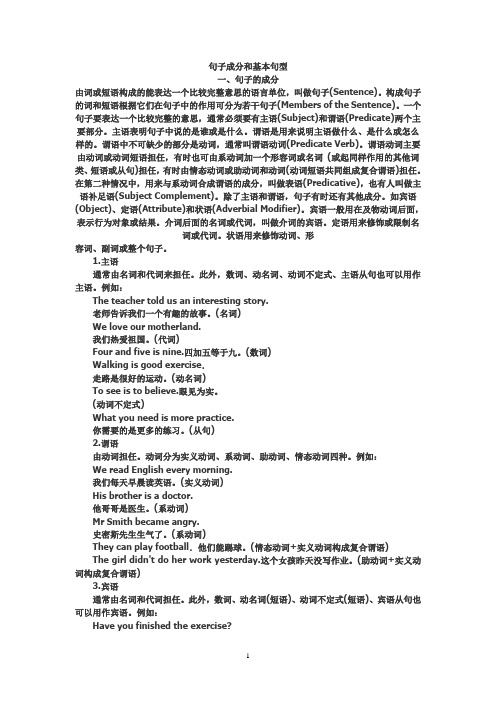
句子成分和基本句型一、句子的成分由词或短语构成的能表达一个比较完整意思的语言单位,叫做句子(Sentence)。
构成句子的词和短语根据它们在句子中的作用可分为若干句子(Members of the Sentence)。
一个句子要表达一个比较完整的意思,通常必须要有主语(Subject)和谓语(Predicate)两个主要部分。
主语表明句子中说的是谁或是什么。
谓语是用来说明主语做什么、是什么或怎么样的。
谓语中不可缺少的部分是动词,通常叫谓语动词(Predicate Verb)。
谓语动词主要由动词或动词短语担任,有时也可由系动词加一个形容词或名词(或起同样作用的其他词类、短语或从句)担任,有时由情态动词或助动词和动词(动词短语共同组成复合谓语)担任。
在第二种情况中,用来与系动词合成谓语的成分,叫做表语(Predicative),也有人叫做主语补足语(Subject Complement)。
除了主语和谓语,句子有时还有其他成分。
如宾语(Object)、定语(Attribute)和状语(Adverbial Modifier)。
宾语一般用在及物动词后面,表示行为对象或结果。
介词后面的名词或代词,叫做介词的宾语。
定语用来修饰或限制名词或代词。
状语用来修饰动词、形容词、副词或整个句子。
1.主语通常由名词和代词来担任。
此外,数词、动名词、动词不定式、主语从句也可以用作主语。
例如:The teacher told us an interesting story.老师告诉我们一个有趣的故事。
(名词)We love our motherland.我们热爱祖国。
(代词)Four and five is nine.四加五等于九。
(数词)Walking is good exercise.走路是很好的运动。
(动名词)To see is to believe.眼见为实。
(动词不定式)What you need is more practice.你需要的是更多的练习。
句子成分与基本句型

句子成分与基本句型英语的句子成分总共七个英语的句子成分总共七个: : : 主语、谓语、宾语、表语、补语、定语、状语。
主语、谓语、宾语、表语、补语、定语、状语。
一、主语主语是一个句子叙述的主体。
我们可以这样理解,我们可以这样理解,主语就是一句话主要叙述的对象,主语就是一句话主要叙述的对象,主语就是一句话主要叙述的对象,或者这句话主或者这句话主要讲的内容。
这句话主要讲什么,这个“什么”就是主语。
例如要讲的内容。
这句话主要讲什么,这个“什么”就是主语。
例如 I am a teacher I am a teacher I am a teacher(我是老师)(我是老师),主要讲的是“I I ””。
而不是“。
而不是“teacher teacher teacher”” . . 所以所以“I”是主语。
“I”是主语。
Chinese is hard Chinese is hard Chinese is hard 这里主要讲的是这里主要讲的是“Chinese Chinese”” ,而不是“hard hard””.所以Chinese Chinese 是主语。
是主语。
一般来说,能够充当主语的词语有:名词、代词、数词、动词不定式、动名词、句子、其他。
1、名词名词都可以做主语。
但是什么是名词?名词就是世间万物的名称。
世间万物,不管看得见的,还是看不见的都有一个名称。
比如我们自己的名称,就是人名。
比如 Tom, Mary. Tom, Mary.地方的名称,就是地名。
地方的名称,就是地名。
比如,比如, China China China、、Guangdong Guangdong、、Puning Puning。
我们生活中,所有可以看见的物品,比如,电脑(我们生活中,所有可以看见的物品,比如,电脑(computer computer computer))、书(book)(book)、房子、房子、房子(house)(house)(house)、、钢笔钢笔(pen)(pen)(pen)等等。
句子成分及五种基本句型
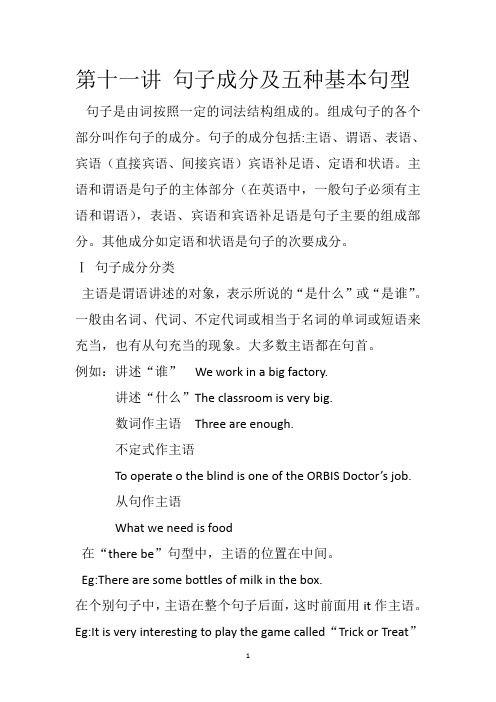
第十一讲句子成分及五种基本句型句子是由词按照一定的词法结构组成的。
组成句子的各个部分叫作句子的成分。
句子的成分包括:主语、谓语、表语、宾语(直接宾语、间接宾语)宾语补足语、定语和状语。
主语和谓语是句子的主体部分(在英语中,一般句子必须有主语和谓语),表语、宾语和宾语补足语是句子主要的组成部分。
其他成分如定语和状语是句子的次要成分。
Ⅰ句子成分分类主语是谓语讲述的对象,表示所说的“是什么”或“是谁”。
一般由名词、代词、不定代词或相当于名词的单词或短语来充当,也有从句充当的现象。
大多数主语都在句首。
例如:讲述“谁”We work in a big factory.讲述“什么”The classroom is very big.数词作主语Three are enough.不定式作主语To operate o the blind is one of the ORBIS Doctor’s job.从句作主语What we need is food在“there be”句型中,主语的位置在中间。
Eg:There are some bottles of milk in the box.在个别句子中,主语在整个句子后面,这时前面用it作主语。
Eg:It is very interesting to play the game called“Trick or Treat”It took two workers about three months to build the house. 2.谓语谓语是用来说明主语“是什么”,“做什么”,“怎么样”,谓语必须是动词,谓语和主语在“人称”和“数”两方面必须一致。
Eg:He is very generous.She looks very smart and cool.We have finished the job.He can speak German.3.表语表语说明主语“是什么”或“怎么样”,由名词、形容词、介词、副词、不定式及相当于名词的词或短语来充当,它的位置在系动词后面。
句子成分及五种基本句型

句子成分及五种基本句型一、句子成分组成句子的各个组成部分叫句子成分:主、谓、表、宾、定、状、补1.主语:是一个句子的主干部分之一,主语表明是“什么人”,“什么事通常由名词,代词, 动词不定式,动名词来充当.1.Lucy likes her new bike.2.Ve work hard.3.To learn a foreign language is not easy.4.Playing football after school is great fun.2 •谓语:说明主语做什么或怎么样。
通常由动词充当.动词常分为实义动词,连系动词,情态动词和助动词.1.thev work verv hard.2.Tom likes reading.△情态动词和助动词不能单独充当谓语,必须和实义动词或系动词一起构成谓语.They can speak English well. They are playing over there.3.表语:跟在连系动词后面的词语或从句,用来说明主语的身份,特征,状态.My sister becomes a nurse. The trees turn green.The flower is beautiful •To see is to believe •4.宾语:动作行为的对象,说明主语做什么。
一般放在及物动词或介词后面.由名词,代词, 数词,动词不定式,动名词和宾语从句构成.LWe study English.2.1saw him yesterday.3.He wanted to have a pen.4・She likes playing basketball.5.Our teacher said that he would go there.△双宾语:指人的是间接宾语,指物的是直接宾语。
He gave me two books. She teaches me English・5.定语:用来修饰名词或代词的词.充当定语的有:形容词,形容词性物主代词,名词,不定式,介词短语,不定代词,从句等.K This is a red car.2.The building is their teaching building.3.The woman doctor is my wife.4- I have something to tell you.5.The man in front of the gate is Mr. Li.6.Every student has an English book.7x I know the boy who is playing basketball on the playground.6.状语:说明动作或状态特征修饰用来修饰动词,形容词,副词或整个句子.副词,介词短语,动词不定式,以及after, when, as soon as , until, if, before等引起的从句作状语•R You are quite right. 2> Tliey often draw in the park.We came here in order to learn English・4> If it rains tomorrow, we will stay at home. 7.宾补:补充说明宾语。
句子成分与基本句型

句子成分与基本句型1.主语(subject): 句子说明的人或事物。
The sun rises in the east.(名词)He likes dancing.(代词)Twenty years is a short time in history. (数词) To see is to believe.(不定式)Seeing is believing.(动名词)What he needs is a book. (主语从句)It is very clear that the elephant is round and tall like a tree.(It形式主语,主语从句是真正主语)2.谓语(predicate): 说明主语的动作、状态和特征。
We study English. He is asleep.3.表语(predicative): 系动词之后的成分,表示主语的性质、状态和特征。
He is a teacher.(名词)She was very tired and looked it.(代词)Five and five is ten.(数词) He is asleep.(形容词)His father is in.(副词)The picture is on the wall. ( 介词短语) My watch is gone / missing / lost. (形容词化的分词)To wear a flower is to say “I’m poor, I can’t buy a ring. (不定式)The question is whether they will come. (表语从句)(常见的系动词有: be, sound(听起来), look(看起来), feel(摸起来,smell(闻起来), taste(尝、吃起来), remain(保持,仍是), feel(感觉)...It sounds a good idea. The sound sounds strange. Her voice sounds sweet. Tom looks thin.The food smells delicious. The food tastes good. The door remains open. Now I feel tired.4.宾语:1)动作的承受者-----动宾I like China.(名词)He hates you.(代词)How many do you need? We need two.(数词)We should help the old and the poor. (形容词) I enjoy working with you. (动名词)I hope to see you again.(不定式)Did you write down what he said? (宾语从句)2)介词后的名词、代词和动名词-----介宾Are you afraid of the snake? Under the snow, there are many rocks.3)双宾语-----间宾(指人)和直宾(指物)He gave me a book yesterday. Give the poor man some money.5.宾补:对宾语的补充,全称为宾语补足语。
句子成分和五种基本句型

Exercises:
1.Don’t leave the water______ while you brush your teeth. (2004年天津) A. run B. running C. being run D. to run 2. You should understand the traffic rule by now. You’ve had it______ often enough. (2005年天津) A. explaining B. to explain C. explain D. explained
三、祈使句: Be sure to get here before nine. You do it right now. 四、感叹句: ① what + 感叹句: What a noble-hearted man he was! What good news it is! ② how + 感叹句: How well she dances! How fast they are working!
They found her happy that day.
2.主语+不及物动词 来自 S + Vi. )The telephone rang. His father might have died. We all breathe, drink and eat.
注:这种结构中的谓语动词是不及物动词,状语并非结构 上不可缺少的成分。但在某种情况下,不加状语便不能表 达完整的意思,这就引出了下列句型:
A great deal of water is used by people in that city. (被动语态)
She is reading a novel. You may have seen each other. He is doing morning exercises. This factory makes machine tools. Mary has ordered a new dress. I have had my lunch. 注:这种结构中的谓语动词是及物动词,后面只跟一个宾语,因 此称单宾及物动词,一般不需状语即可表达完整的意思。但在某些 情况下,状语必不可少,这就引出了下列句型: △ 主语 + 谓语 + 宾语 + 状语: He put the vase on the table. Jim brought his suitcases upstairs. I’ll take Mary to the station. They treated him kindly.
句子成分+基本句型

语法复习:句子成分;简单句、并列句和复合句一、句子成分(一)句子成分的定义:构成句子的各个部分叫做句子成分。
句子成分有主要有主语、谓语表语、宾语、定语、状语、补足语、同位语、插入语和呼语。
(二)主语:主语是一个句子所叙述的主体,一般位于句首。
但在there be结构、疑问句(当主语不疑问词时)和倒装句中,主语位于谓语、助动词或情态动词后面。
主语可由名词、代词、数词、不定式、动名词、名词化的形容词和主语从句等表示。
例如:During the 1990s, American country music has become more and more popular.(名词)We often speak English in class.(代词)One-third of the students in this class are girls.(数词)To swim in the river is a great pleasure.(不定式)Smoking does harm to the health.(动名词)The rich should help the poor.(名词化的形容词)When we are going to have an English test has not been decided.(主语从句)It is necessary to master a foreign language.(it作形式主语,真正的主语为后面的不定式)(三)谓语:谓语说明主语所做的动作或具有的特征和状态。
动词在句中作谓语,一般放在主语之后。
谓语的构成如下:1、简单谓语:由一个动词或动词短语构成。
如:He practices running every morning.2、复合谓语:(1)由情态动词或其他助动词加动词原形构成。
如:You may keep the book for two weeks. He has caught a bad cold. (2)由系动词加表语构成。
句子的成分和基本句型
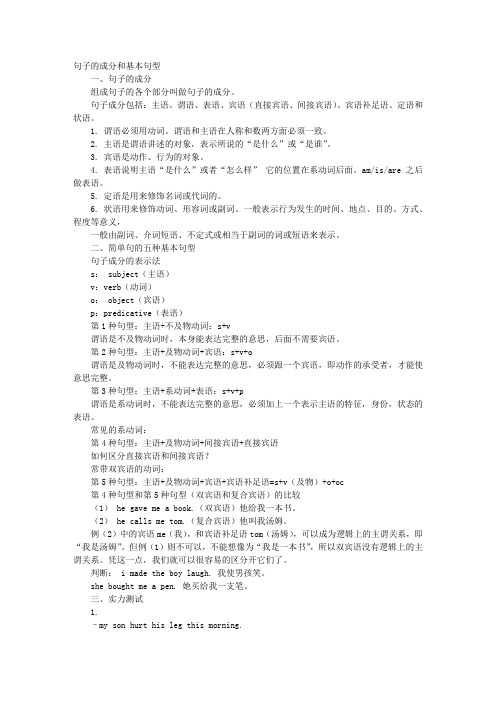
句子的成分和基本句型一、句子的成分组成句子的各个部分叫做句子的成分。
句子成分包括:主语、谓语、表语、宾语(直接宾语、间接宾语)、宾语补足语、定语和状语。
1. 谓语必须用动词。
谓语和主语在人称和数两方面必须一致。
2. 主语是谓语讲述的对象,表示所说的“是什么”或“是谁”。
3. 宾语是动作、行为的对象。
4. 表语说明主语“是什么”或者“怎么样”它的位置在系动词后面。
am/is/are之后做表语。
5. 定语是用来修饰名词或代词的。
6. 状语用来修饰动词、形容词或副词。
一般表示行为发生的时间、地点、目的、方式、程度等意义,一般由副词、介词短语、不定式或相当于副词的词或短语来表示。
二、简单句的五种基本句型句子成分的表示法s: subject(主语)v:verb(动词)o: object(宾语)p:predicative(表语)第1种句型:主语+不及物动词:s+v谓语是不及物动词时,本身能表达完整的意思,后面不需要宾语。
第2种句型:主语+及物动词+宾语:s+v+o谓语是及物动词时,不能表达完整的意思,必须跟一个宾语,即动作的承受者,才能使意思完整。
第3种句型:主语+系动词+表语:s+v+p谓语是系动词时,不能表达完整的意思,必须加上一个表示主语的特征,身份,状态的表语。
常见的系动词:第4种句型:主语+及物动词+间接宾语+直接宾语如何区分直接宾语和间接宾语?常带双宾语的动词:第5种句型:主语+及物动词+宾语+宾语补足语=s+v(及物)+o+oc第4种句型和第5种句型(双宾语和复合宾语)的比较(1) he gave me a book.(双宾语)他给我一本书。
(2) he calls me tom.(复合宾语)他叫我汤姆。
例(2)中的宾语me(我),和宾语补足语tom(汤姆),可以成为逻辑上的主谓关系,即“我是汤姆”。
但例(1)则不可以,不能想像为“我是一本书”,所以双宾语没有逻辑上的主谓关系。
凭这一点,我们就可以很容易的区分开它们了。
句子成分和基本句式
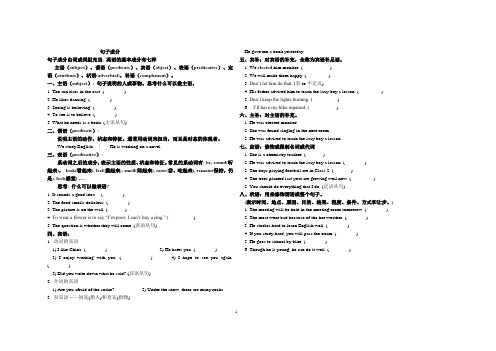
句子成分句子成分由词或词组充当, 英语的基本成分有七种主语(subject)、谓语(predicate)、宾语(object)、表语(predicative)、定语(attribute)、状语(adverbial),补语(complement)。
一、主语(subject): 句子说明的人或事物。
思考什么可以做主语。
1. The sun rises in the east. ( )2. He likes dancing. ( )3. Seeing is believing. ( )4. To see is to believe. ( )5. What he needs is a book. (主语从句)二、谓语(predicate):说明主语的动作、状态和特征。
通常用动词来担当,而且是时态的体现者。
We study English. | He is working on a novel.三、表语(predicative):系动词之后的成分,表示主语的性质、状态和特征。
常见的系动词有: be, sound(听起来),look(看起来), feel(摸起来), smell(闻起来), taste(尝、吃起来), remain(保持,仍是), feel(感觉) ….思考: 什么可以做表语?1.It sounds a good idea. ( )2.The food smells delicious. ( )3.The picture is on the wall. ( )4.To wear a flower is to say “I’m poor, I can’t buy a ring.” ()5.The question is whether they will come. (表语从句)四、宾语:1. 动词的宾语1) I like China. ( ) 2) He hates you. ( )3) I enjoy working with you. ( ) 4) I hope to see you again. ( )5) Did you write down what he said? (宾语从句)2. 介词的宾语1) Are you afraid of the snake? 2) Under the snow, there are many rocks. 3. 双宾语——间宾(指人)和直宾(指物)He gave me a book yesterday.五、宾补:对宾语的补充,全称为宾语补足语。
- 1、下载文档前请自行甄别文档内容的完整性,平台不提供额外的编辑、内容补充、找答案等附加服务。
- 2、"仅部分预览"的文档,不可在线预览部分如存在完整性等问题,可反馈申请退款(可完整预览的文档不适用该条件!)。
- 3、如文档侵犯您的权益,请联系客服反馈,我们会尽快为您处理(人工客服工作时间:9:00-18:30)。
句子成分与基本句型1.主语(subject): 句子说明的人或事物。
The sun rises in the east.(名词)He likes dancing.(代词)Twenty years is a short time in history. (数词) To see is to believe.(不定式)Seeing is believing.(动名词)What he needs is a book. (主语从句)It is very clear that the elephant is round and tall like a tree.(It形式主语,主语从句是真正主语)2.谓语(predicate): 说明主语的动作、状态和特征。
We study English. He is asleep.3.表语(predicative): 系动词之后的成分,表示主语的性质、状态和特征。
He is a teacher.(名词)She was very tired and looked it.(代词)Five and five is ten.(数词) He is asleep.(形容词)His father is in.(副词)The picture is on the wall. ( 介词短语) My watch is gone / missing / lost. (形容词化的分词)To wear a flower is to say “I’m poor, I can’t buy a ring. (不定式)The question is whether they will come. (表语从句)(常见的系动词有: be, sound(听起来), look(看起来), feel(摸起来,smell(闻起来), taste(尝、吃起来), remain(保持,仍是), feel(感觉)...It sounds a good idea. The sound sounds strange. Her voice sounds sweet. Tom looks thin.The food smells delicious. The food tastes good. The door remains open. Now I feel tired.4.宾语:1)动作的承受者-----动宾I like China.(名词)He hates you.(代词)How many do you need? We need two.(数词)We should help the old and the poor. (形容词) I enjoy working with you. (动名词)I hope to see you again.(不定式)Did you write down what he said? (宾语从句)2)介词后的名词、代词和动名词-----介宾Are you afraid of the snake? Under the snow, there are many rocks.3)双宾语-----间宾(指人)和直宾(指物)He gave me a book yesterday. Give the poor man some money.5.宾补:对宾语的补充,全称为宾语补足语。
We elected him monitor(名词)We all think it a pity that she didn’t come here.(名)We will make them happy(形容词)We found nobody in.(副词)Please make yourself at home.(介词短语)Don’t let him do that. (省to不定式)His father advised him to teach the lazy boy a lesson.(带to不定式)Don’t keep the lights burning.(现在分词)I’ll have my bike repaired.(过分词)6.主补:对主语的补充。
He was elected monitor. She was found singing in the next room.He was advised to teach the lazy boy a lesson.7.定语:修饰或限制名词或代词的词、词组或句子。
Ai Yanling is a chemistry teacher.(名词)He is our friend.(代词)We belong to the third world.(数词)He was advised to teach the lazy boy a lesson.(形容词)The man over there is my old friend.(副词) The woman with a baby in her arms is my sister. (介词)The boys playing football are in Class 2.(现在分词)The trees planted last year are growing well now. (过分)I have an idea to do it well.(不定式)You should do everything that I do. (定语从句)8.状语:用来修饰v., adj., adv., or 句子。
表示时间、地点、原因、目的、结果、程度、条件、方式和让步。
(以下例句按上述顺序排列)I will go there tomorrow. The meeting will be held in the meeting room.The meat went bad because of the hot weather. He studies hard to learn English well.He didn’t study hard so that he failed in the exam. I like some of you very much.If you study hard, you will pass the exam. He goes to school by bike.Though he is young, he can do it well.9. 独立成分:与句子其他成分没有通常的语法关系,如插入语、感叹语、呼语等,一般用逗号将它与句子隔开。
如:He’s a nice person, to be sure. 肯定他是一个好人。
Strange to say, he did pass his exam after all. 说也奇怪,考试他竟然通过了。
10.英语句子成分歌英语句子八呀八大块,主谓宾表真呀真实在;补语跟着宾语表语跑,定语同位(语)专把名词踹。
状语的位置它自由自在,忽右忽左随心所欲摆。
浑身的毛病真呀真不少,前后乱窜它还会加塞。
(RAP)11.英语五种基本句型英语句子万万千,五大句型把线牵。
句型种类为动词,后接什么是关键;系词后面接表语;vi独身无牵连;vt又可分三类,单宾双宾最常见,还有宾语补足语;各种搭配记心间。
英语五种基本句型列式如下:基本句型一:S+V(主+谓)基本句型二:S+V+P(主+系+表)基本句型三:S+V+O(主+谓+宾)基本句型四:S+V+IO +O(主+谓+间宾+直宾)基本句型五:S+V+O+C(主+谓+宾+宾补)基本句型一S+V(主+谓)/主语+不及物动词此句型的句子有一个共同特点,即句子的谓语动词都能表达完整的意思。
这类动词叫做不及物动词,后面可以跟副词、介词短语、状语从句等。
The rain stopped. They work hard. The old man walks in t he park .基本句型二S+V+P(主+系+表)/主语+系动词+表语(名、代、形、介词等)此句型的句子有一个共同的特点:句子谓语动词(系动词本身)都不能表达一个完整的意思,需要形容词,名词,介词短语等来补充说明主语,也叫主语补语。
系动词分两类:be, look, feel, smell, taste, sound 等属一类,表示情况;get, grow, become, turn, go等属另一类,表示变化。
be 本身没有什么意义,只起连系主语和表的作用。
其它系动词仍保持其部分词义,如:stay, prove, remain, stand。
The flower is dead. I feel quite hungry.基本句型三S+V+O(主+谓+宾)/主语+及物动词+宾语此句型句子的共同特点是:谓语动词都具有实义,都是主语产生的动作,但不能表达完整的意思,必须跟有一个宾语,即动作的承受者,才能使意思完整。
这类动词叫做及物动词。
Plants need water. Do you know him ?基本句型四S+V+IO +O(主+谓+间宾+直宾)此句型的句子有一个共同特点:谓语动词必须跟有两个宾语才能表达完整的意思。
这两个宾语一个是动作的直接承受者,另一个是动作的间接承受者。
He gives me some seeds. Give me the book, please.基本句型五S+V+O+C(主+谓+宾+宾补)此句型的句子的共同特点是:动词虽然是及物动词,但是只跟一个宾语还不能表达完整的意思,必须加上一个补充成分来补足宾语,才能使意思完整。
We elected him our monitor. I found my money stolen . The news made us sad.12.翻译练习:主谓结构(主语+不及物动词)1.你应当努力学习。
2.她昨天回家很晚。
主系表结构(主语+系动词+表语)1.我的兄弟都是大学生。
2.冬季白天短,夜晚长。
主谓宾结构(主语+及物动词+宾语)1.昨晚我写了一封信。
2.今天下午我想同你谈谈。
双宾语结构(主语+双宾动词+间接宾语+直接宾语)1 .Johnson 先生去年教我们德语。
2. 奶奶昨晚给我们讲了一个有趣的故事复合宾语结构(主语+动词+宾语+宾语补足语)1.我们叫她Alice.2.他的父母给他取名为John.答案:1.You should study hard.2. She went home very late yesterday evening.1.My brothers are all college students.2 .In winter, the days are short and the nights are long.1.I wrote a letter last night.2.I want to talk with you this afternoon.1.Mr Johnson taught us German last year.2.Grandma told me an interesting story last night.1. We call her Alice.2 .His parents named him John.。
